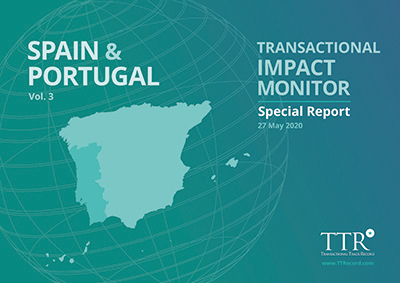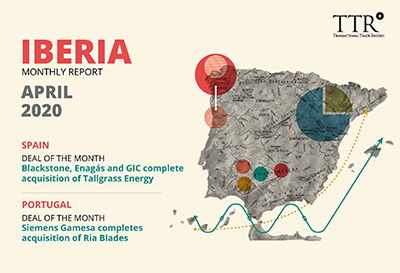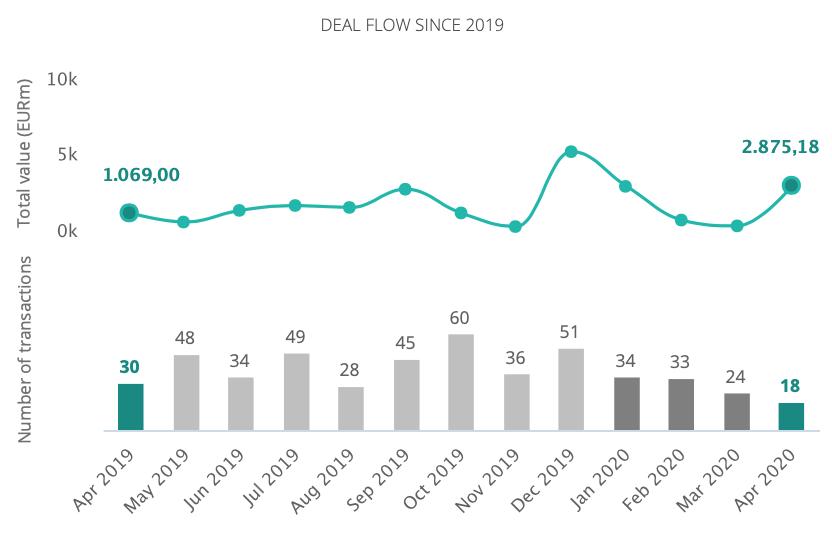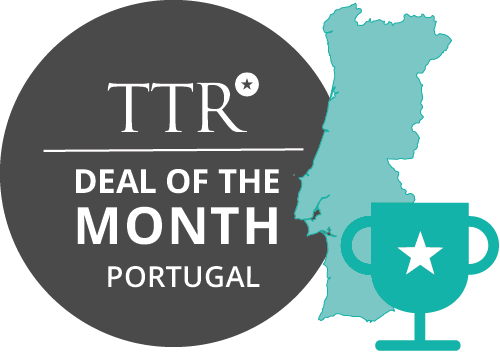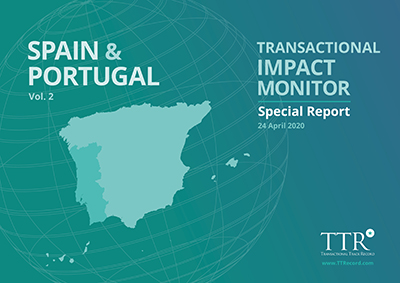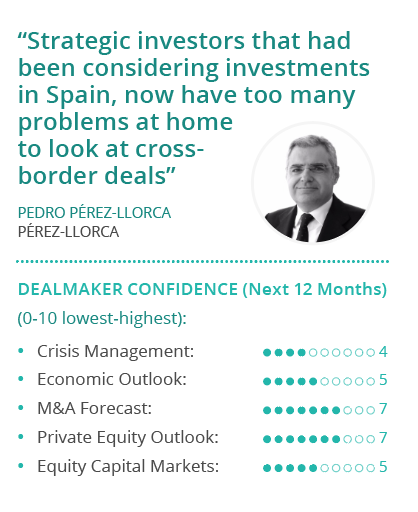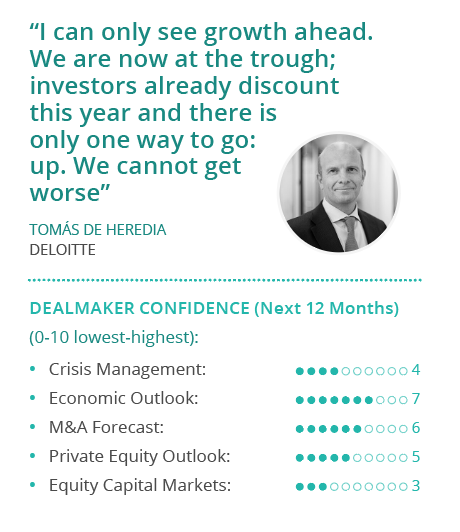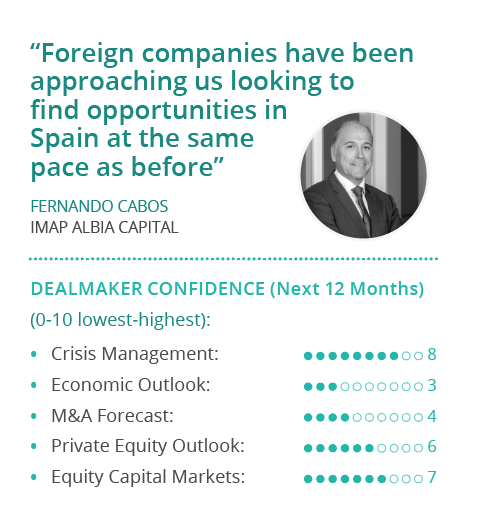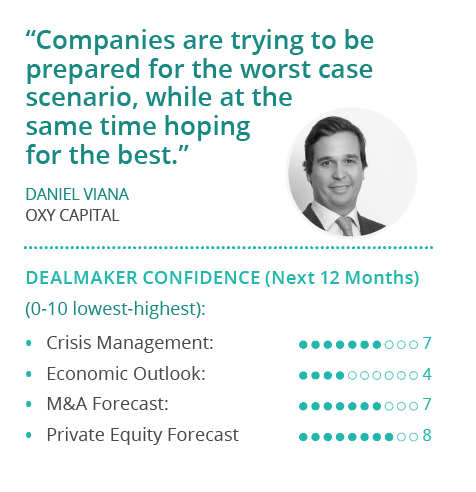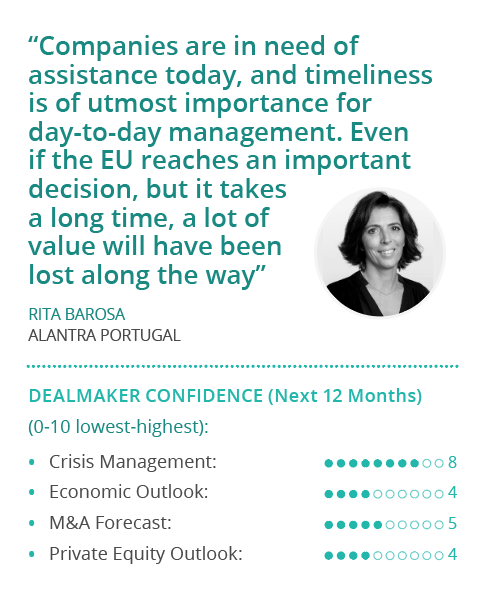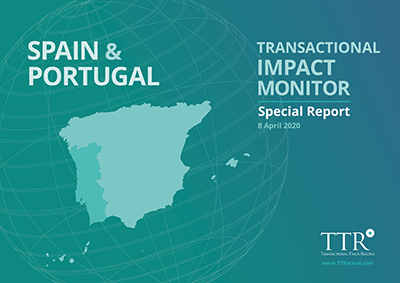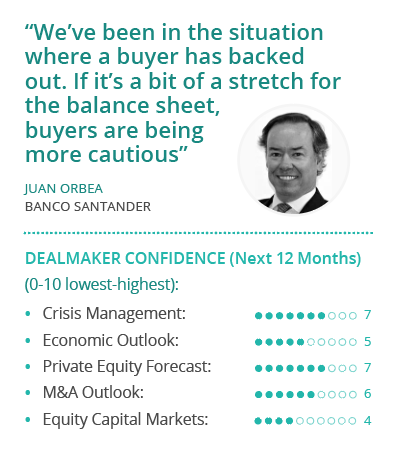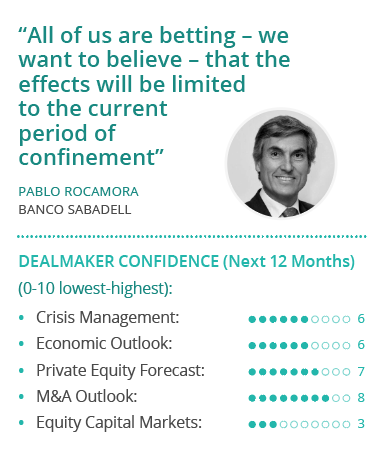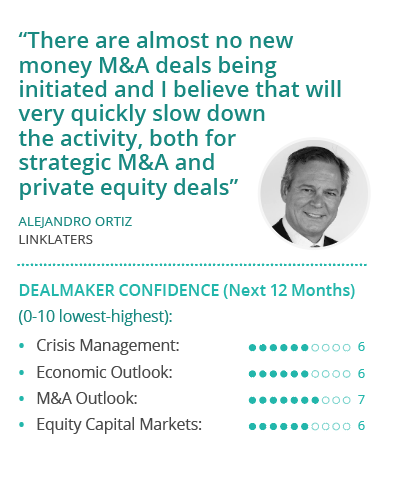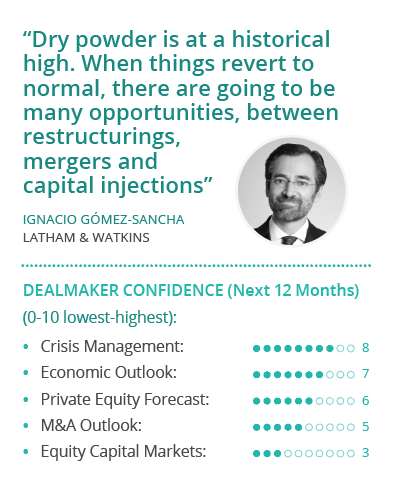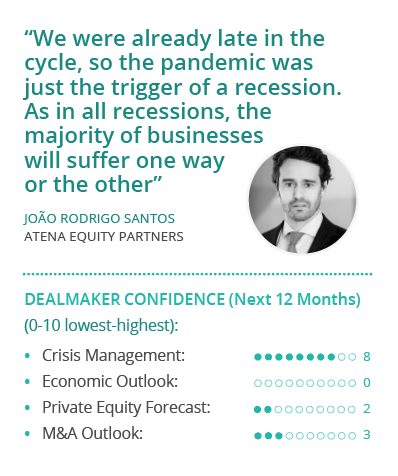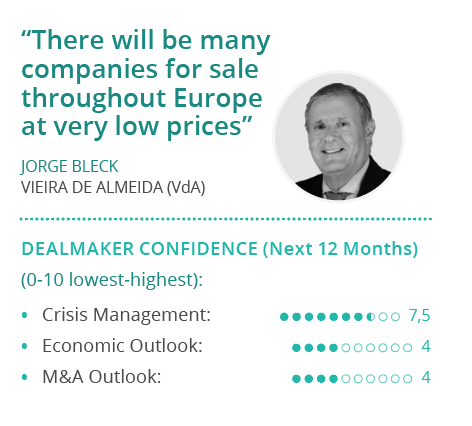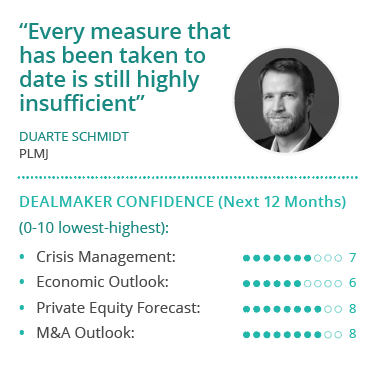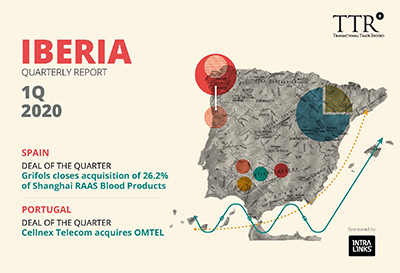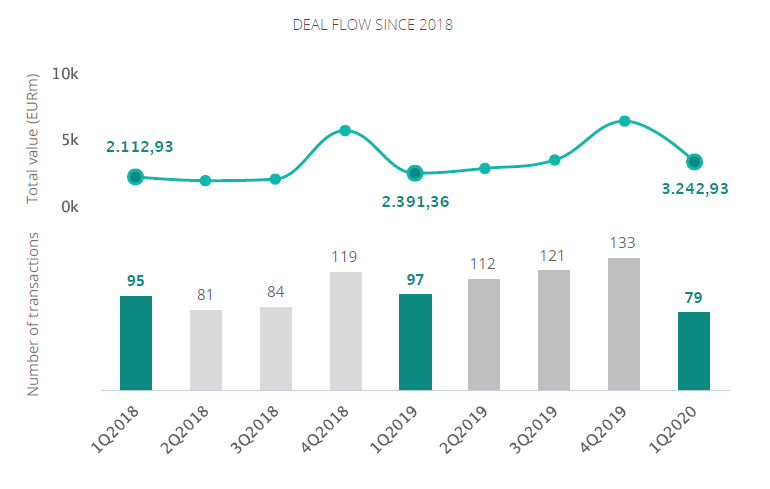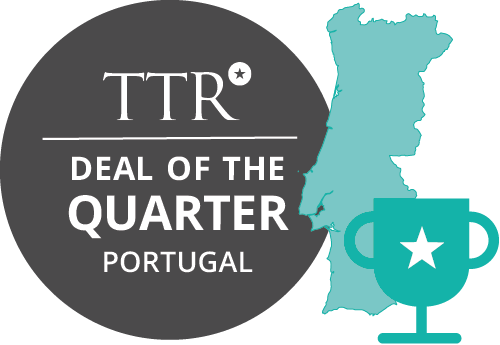Transactional Impact Monitor: Spain & Portugal – Vol. 3
27 May 2020
TTR’s Transactional Impact Monitor (TIM) is a Special Report combining local knowledge and market visibility from top dealmakers developed to address extraordinary situations affecting the macroeconomic stability and M&A outlook in core markets
INDEX
SPAIN
– M&A Outlook
– Private Equity
– Equity Capital Markets
– Handling the Crisis
PORTUGAL
– M&A Outlook
– Private Equity
– Handling the Crisis
– The View from Milan
– Dealmaker Profiles
SPAIN
As Spain approaches the 10-week mark since the royal decree was issued declaring a state of emergency on 11 March, the country has begun tiptoeing back to normalcy, or what even the government describes as the “new normal”, with a phased approach to the easing of restrictions on business activities and movement.
In phase one, which began 11 May, family members and friends are permitted to gather in groups of up to 10 persons in homes, open-air restaurants and bars, with a limit set at 50% of the normal maximum occupancy. In phase 2, which had a provisional start date of Monday, 25 May, family members will be permitted to visit their relatives in old age homes, one at a time, provided there are no Covid-19 infections among the residents. The limit on the number of persons permitted to congregate will increase to 15 and patrons will be able to sit inside restaurants and bars for table service.
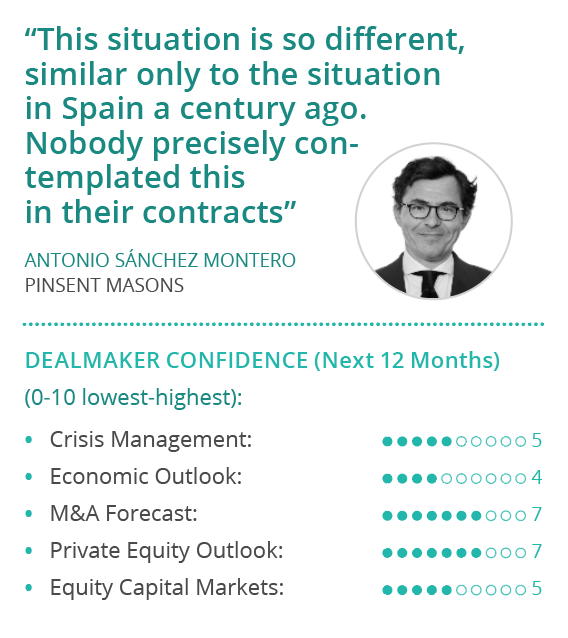
Phase 3 will begin on 8 June, at the earliest, pending continued improvement in the health situation, with the government determining the pace of advancement from one phase to the next independently for each autonomous community. Once in phase three, protocols for workers to be reincorporated into the workplace will be implemented and patrons will be permitted to stand in bars once again. Travel beyond the province of residence will only be permitted after 22 June, at the earliest, and only to other regions of Spain that are in the same phase in the resumption of normal business activities.
Things are slightly better now, commented Écija Partner Emilio Prieto. “From the public health perspective, I believe the worst has passed. From an economic standpoint, however, things will be very tough for Spain,” he said.
In the tourism and hospitality industry, for example, which represents nearly 15% of Spain’s GDP, 2020 is a lost year, said Prieto, and 2021 will also be very difficult. “For the restaurant industry, where we have seen a lot of investment in recent years, the blow has obviously been nothing less than colossal,” he said. To make things worse, the new social distancing norms, which will continue to be enforced post-lockdown, will make several businesses simply inoperable, he added. “These are businesses that normally require a minimum occupancy rate of around 80% to remain viable; the owners of these establishments already know this is out of the question,” Prieto said.

Retail, leisure, hospitality and related sectors are among those suffering most, while deals in the healthcare industry, old age homes and pharmaceuticals, along with financial services, and wealth management, in particular, remain on track, according to Pinsent Masons Partner Antonio Sánchez Montero.
Regardless of what happens, Spaniards will eventually go back to restaurants and bars and those businesses will inevitably bounce back, sooner or later, Prieto said. “We are essentially gregarious people; socializing is in our nature,” he noted.
The new normal will look a lot different where the workplace environment is concerned, however, Prieto said. “The only thing we can be absolutely certain of, in the middle of all this anxiety and confusion, is that remote working is here to stay,” Prieto said.
“Why should a company pay for a five-story office in the center of Madrid when it can accommodate a portion of its employees in three floors and have the rest working remotely from home?” Prieto said. These remote workers will not only benefit from a much better work-family balance, but the cost savings involved are staggering, Prieto noted. “Some of our international clients are already moving in that direction,” Prieto said. “They have renegotiated rent prices and are now planning to sublet part of their space to other tenants and probably vacate part of the total area at the end of their contracts,” he said. Real estate will, no doubt, suffer as a result, particularly commercial space and corporate offices, Prieto noted.
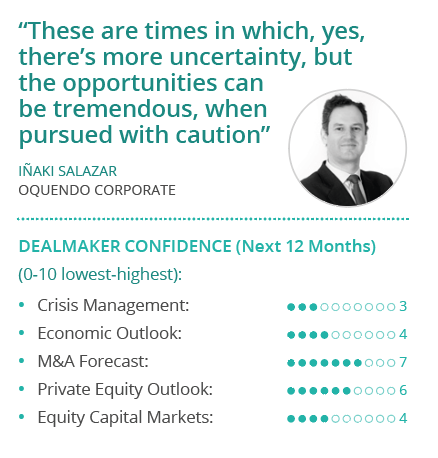
Given the continuing uncertainty, it’s impossible to make foolproof macroeconomic projections for the close of 2020, but almost all the indications suggest a fall in GDP of between 7% and 12%, Prieto said.
“So the question, really, seems to be, will things be very bad or simply disastrous?” The key issue now is whether or not there will be a recovery in 2021, said Prieto. In Spain, a country heavily dependent on consumption to drive the economy, there will be economic sectors that suffer tremendously, he said.
“The legal field is privileged in that in times of prosperity, transactional work is in great demand, while in times of crisis, litigious work is in great demand. We saw it 10 years ago, and we are seeing it now,” Pinsent Masons Partner Antonio Sánchez Montero noted.
The impact of force majeure on contracts is keeping legal advisors busy at virtually every firm, he added. “This situation is so different, similar only to the situation in Spain a century ago. Nobody precisely contemplated this in their contracts; they are asking how they can amend terms they’d agreed to under completely different conditions.” Labor advisors also have their hands full amid all the legislative measures implemented to mitigate a sharp rise in unemployment in the aftermath of the lock-down, said Sánchez.
M&A Outlook
… Click here to access the third issue of Transactional Impact Monitor: Spain & Portugal – Vol. 3.
PORTUGAL
Portugal too has begun to implement a phased reactivation of the economy, though the shut down was more limited than in Spain from the outset.

We are still mandatorily working from home until the middle of June, said Abreu Advogados Partner Ana Sofia Batista. “We have this ability to adjust,” said Batista of the Portuguese and local businesses that have faced the current crisis with agility. Notwithstanding, the damage hasn’t been averted, only postponed by the government’s efforts to protect workers, tenants and provide liquidity to the market, she said. The moratorium on commercial and non-commercial rent, for example, is not forgiveness, and rents must be repaid in the first month following termination of the state of emergency.
A similar moratorium extends to companies in a borrowing relationship with the country’s commercial banks, which are in better shape than they were when the global economic crisis hit in 2008. “We think this crisis is very different,” said Batista. The impact is asymmetric, she said, noting certain sectors like energy and health were hardly impacted. “And then you have tourism,” she added, noting there were hotels that probably will be sold and groups that will eventually need to be restructured.
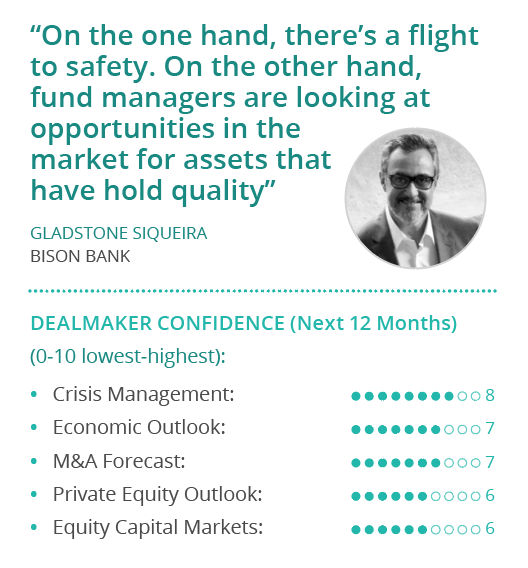
The substantive changes to Portugal’s labor laws and subsequent amendments gave Abreu Advogados a sizeable workload as transactional activity stalled over the past two months, Batista said. “There were very practical issues that needed to be amended and adjusted, which made our work more difficult than it should have been, but it’s natural because legislation was coming out very rapidly,” she explained.
Abreu has been running a series of webinars to keep its clients and broader business network abreast of all the new legislation being enacted. “Things are changing, not day-by-day, but almost,” she said, adding, “We anticipate that many companies will, naturally, suffer.”
Though Portugal has already begun allowing businesses to resume operations according to a phased approach similar to Spain’s, Batista said she sees a wave of restructurings in the latter part of 2020 as the moratorium providing breathing room to corporate borrowers is lifted and creditors take legal action. Judicial administrators will need to act rapidly in 4Q20 to deal with the backlog, she said.
M&A Outlook
… Click here to access the third issue of Transactional Impact Monitor: Spain & Portugal – Vol. 3.
The View from Milan
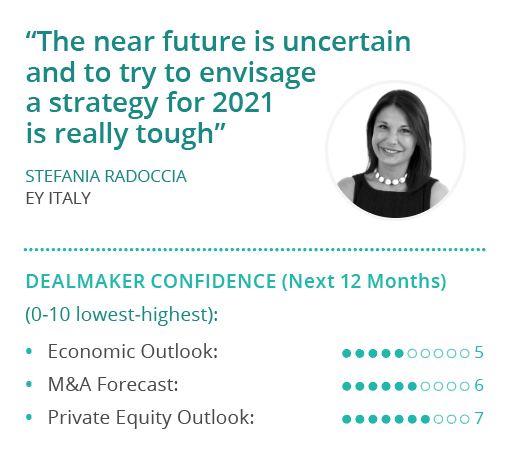
The Special Report has sections on M&A, Private Equity and Handling the Crisis, as well as a first-hand account from Italy in The View From Milan, featuring EY Italy Managing Partner Tax & Law and Mediterranean Region Accounts Leader Stefania Radoccia.
